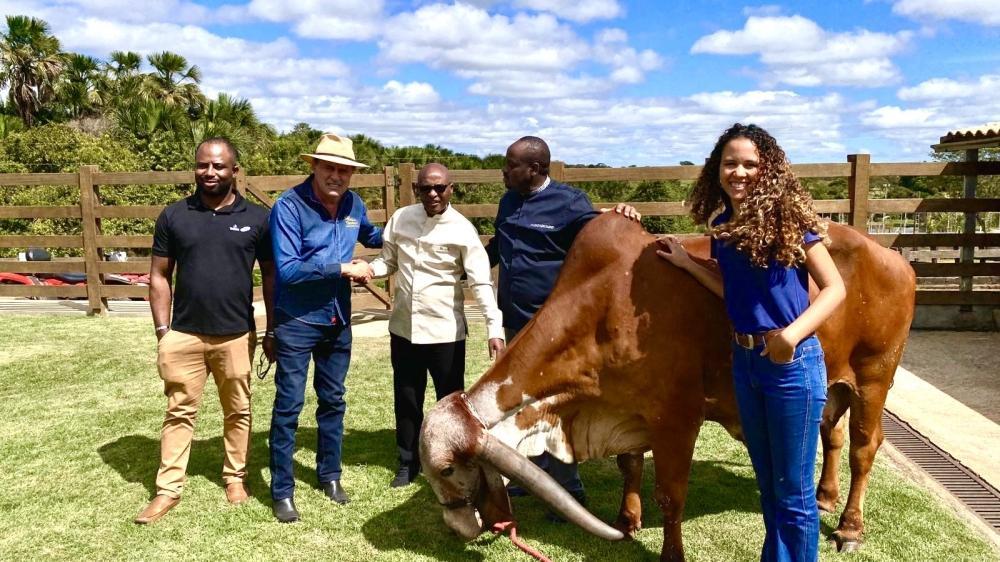Africa-Press – Rwanda. Rwanda is considering the importation of Girolando cattle breeds from Brazil to boost milk production and improve disease resistance, according to the Ministry of Agriculture and Animal Resources.
The Girolando cattle are crossbred dairy cattle developed primarily in Brazil by combining two breeds: the Gyr and the Holstein-Friesian.
The Gyr cattle, a Zebu breed from India, is known for its heat tolerance and resistance to tropical diseases. The Holstein-Friesian, a European breed is renowned for its high milk yield but lower tolerance to tropical conditions.
The Girolando breed is known for high milk production and resilience to heat and disease and its adaptability to tropical climates.
Brazil is the largest producer of Girolando cattle, with over 80% of its milk derived from Girolando herds.
“They are better adapted to our climatic conditions and are more productive for both meat and dairy farming,” stated Solange Uwituze, Deputy Director General in charge of Animal Resources at the Rwanda Agriculture and Animal Resources Development Board (RAB).
Rwanda is seeking to promote the adoption of Girolando cattle following a recent visit by the Minister of Agriculture and Animal Resources, Mark Cyubahiro Bagabe, to a renowned Girolando cattle-breeding centre in Brazil.
The visit aimed to explore partnerships for enhancing Rwanda’s dairy genetics.
Bagabe discussed collaborations to introduce high-yielding cattle in Rwanda and increase milk production through genetic improvement.
“Currently, Rwanda’s average milk production per cow is still very low, around 10 litres per day,” Bagabe said.
However, he noted, some farmers using improved breeds and following best practices in feeding and treatment produce up to 40 litres daily.
“We need to do whatever is necessary to boost milk production. Breeds that are adapted to African climatic conditions, such as those from Brazil, can help. We can import them from any country offering suitable technologies, and Brazil is one such option,” said the minister.
“We share similar ecological conditions with Brazil, particularly with the southern regions that are tropical. Therefore, cows from Brazil are unlikely to face adaptation issues. These breeds are already accustomed to tropical climates, have high productivity, and can withstand climatic stress,” he added.
Rwanda to develop its own genetic traits using Inyambo cattle
In the long term, Bagabe stated that Rwanda aims to develop its own genetic traits capable of withstanding local climate conditions.
“We are very fortunate to have our traditional Inyambo cows, which are tropical animals. They are a valuable landrace, offering genetic traits that provide resistance to diseases common in tropical areas,” he explained.
“We can cross Inyambo cattle with high-yielding cattle from other regions to develop a more resilient and productive national herd.”
Rwanda has introduced several interventions, including improving cattle genetics, to raise milk production after falling short of its target for the 2023–2024 fiscal year.
According to the Ministry of Agriculture, Rwanda produced one million tonnes of milk in 2023–2024, representing 85.7 per cent of the target set under the Fourth Strategic Plan for Agriculture Transformation (PSTA4).
In January 2025, Uwituze told The New Times that the shortfall was primarily due to prolonged and severe drought experienced during the year.
Meanwhile, she noted that the capacity of the Huye-based Songa Centre of Dairy and Genetic Excellence has been enhanced to increase the production of high-quality semen to improve herd genetics and boost milk yields.
“Milk production is still low. One of my cows produces 20 litres per day thanks to improved practices, but I’m looking for cattle breeds that can yield up to 50 litres daily,” said Juliette Mukambonibeshaho, a farmer. “In addition to quality fodder and feed, we need better breeds.”
Rwanda’s first milk powder processing plant, inaugurated in 2024, also requires an adequate milk supply.
At full capacity, the plant can process 650,000 litres of milk per day. However, it is currently operating at under 45% capacity, processing only 292,500 litres per day.
For More News And Analysis About Rwanda Follow Africa-Press






